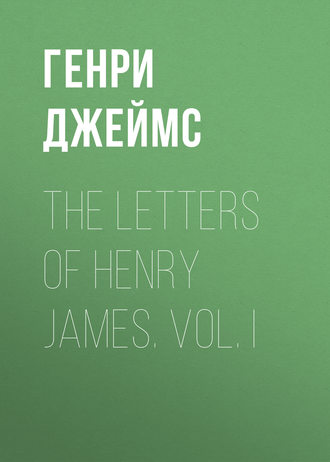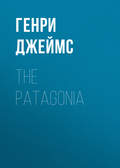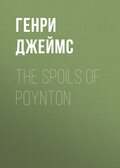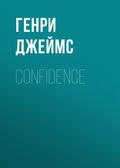
Генри Джеймс
The Letters of Henry James. Vol. I
To W. D. Howells
The Ambassadors began at length to appear in the North American Review, January 1903, where it ran throughout the year.
Dictated.
Lamb House, Rye.Jan. 8th, 1903.
My dear Howells,
Let me beg you first of all not to be disconcerted by this chill legibility. I want to write to you to-day, immediately, your delightful letter of Dec. 29th having arrived this morning, and I can only manage it by dictation as I am, in consequence of some obscure indiscretion of diet yesterday, temporarily sick, sorry, and seedy; so that I can only loll, rather listless (but already better of my poison), in an armchair. My feelings don't permit me to wait to tell you that the communication I have just had from you surpasses for pure unadulterated charm any communication I have ever received. I am really quite overcome and weakened by your recital of the generous way in which you threw yourself into the scale of the arrangement, touching my so long unserialized serial, which is manifestly so excellent a thing for me. I had begun to despair of anything, when, abruptly, this brightens the view. For I like, extremely, the place the N.A.R. makes for my novel; it meets quite my ideal in respect to that isolation and relief one has always fondly conceived as the proper due of one's productions, and yet never, amid the promiscuous petticoats and other low company of the usual magazine table-of-contents, seen them in the remotest degree attended with. One had dreamed, in private fatuity, that one would really be the better for "standing out" a little; but one had, to one's own sense, never really "stood" at all, but simply lain very flat, for the petticoats and all the foolish feet aforesaid to trample over with the best conscience in the world. Charming to me also is the idea of your own beneficent paper in the same quarter—the complete detachment of which, however, from the current fiction itself I equally apprehend and applaud: just as I see how the (not-to-be-qualified) editorial mind would indulge one of its most characteristic impulses by suggesting a connection. Never mind suggestions—and how you echo one of the most sacred laws of my own effort toward wisdom in not caring to know the source of that one! I care to know nothing but that your relation to my stuff, as it stands, gives me clear joy. Within a couple of days, moreover, your three glorious volumes of illustrated prose have arrived to enrich my existence, adorn my house and inflame my expectations. With many things pressing upon me at this moment as preliminary to winding-up here and betaking myself, till early in the summer, to London, my more penetrative attention has not yet been free for them; but I am gathering for the swoop. Please meanwhile be tenderly thanked for the massive and magnificent character of the gift. What a glorious quantity of work it brings home to me that you do! I feel like a hurdy-gurdy man listening outside a cathedral to the volume of sound poured forth there by the enthroned organist.... But good-night, my dear Howells, with every feebly-breathed, but forcibly-felt good wish of yours always and ever,
HENRY JAMES.
To William James
The special business that H. J. hints at in connexion with his projected visit to America was to be the arrangement for a collected edition of his works, a scheme that was now beginning to take shape. With regard to another allusion in this letter, it may be said that the threatened destruction of the old cottages, a few yards from Lamb House, was averted.
Dictated.
Lamb House, Rye.May 24th, 1903.
Dearest William,
How much I feel in arrears with you let this gross machinery testify—which I shamelessly use to help to haul myself into line. However, you have most beneficently, from of old, given me free licence for it. Other benefits, unacknowledged as yet, have I continued to receive from you: I think I've been silent even since before your so cheering (about yourself) letter from Ashville, followed, a few days before I left town (which I did five days ago), by your still more interesting and important one (of May 3d) in answer to mine dealing (so tentatively!) with the question of my making plans, so far as complicatedly and remotely possible, for going over to you for 6 or 8 months. There is—and there was when I wrote—no conceivability of my doing this for a year at least to come—before August 1904, at nearest; but it kind of eases my mind to thresh the idea out sufficiently to have a direction to tend to meanwhile, and an aim to work at. It is in fact a practical necessity for me, dès maintenant, to know whether or no I absolutely want to go if, and when, I can: such a difference in many ways (more than I need undertake to explain) do the prospect of going and the prospect of not going make. Luckily, for myself, I do already (as I feel) quite adequately remain convinced that I shall want to whenever I can: that is [if] I don't put it off for much more than a year—after which period I certainly shall lose the impulse to return to my birth-place under the mere blight of incipient senile decay. If I go at all I must go before I'm too old, and, above all, before I mind being older. You are very dissuasive—even more than I expected; but I think it comes from your understanding even less than I expected the motives, considerations, advisabilities etc., that have gradually, cumulatively, and under much study of the question, much carefully invoked light on it, been acting upon me. I won't undertake just now to tell you what all these reasons are, and how they show to me—for there is still plenty of time to do that. Only I may even at present say that I don't despair of bringing you round in the interval (if what is beyond the interval can realise itself) to a better perception of my situation. It is, roughly—and you will perhaps think too cryptically—speaking, a situation for which 6 or 8 months in my native land shine before me as a very possible and profitable remedy: and I don't speak not by book. Simply and supinely to shrink—on mere grounds of general fear and encouraged shockability—has to me all the air of giving up, chucking away without a struggle, the one chance that remains to me in life of anything that can be called a movement: my one little ewe-lamb of possible exotic experience, such experience as may convert itself, through the senses, through observation, imagination and reflection now at their maturity, into vivid and solid material, into a general renovation of one's too monotonised grab-bag. You speak of the whole matter rather, it seems to me, "à votre aise"; you make, comparatively, and have always made, so many movements; you have travelled and gone to and fro—always comparatively!—so often and so much. I have practically never travelled at all—having never been economically able to; I've only gone, for short periods, a few times—so much fewer than I've wanted—to Italy: never anywhere else that I've seen every one about me here (who is, or was, anyone) perpetually making for. These visions I've had, one by one, all to give up—Spain, Greece, Sicily, any glimpse of the East, or in fact of anything; even to the extent of rummaging about in France; even to the extent of trudging about, a little, in Switzerland. Counting out my few dips into Italy, there has been no time at which any "abroad" was financially convenient or possible. And now, more and more, all such adventures present themselves in the light of mere agreeable luxuries, expensive and supererogatory, inasmuch as not resolving themselves into new material or assimilating with my little acquired stock, my accumulated capital of (for convenience) "international" items and properties. There's nothing to be done by me, any more, in the way of writing, de chic, little worthless, superficial, poncif articles about Spain, Greece, or Egypt. They are the sort of thing that doesn't work in at all to what now most interests me: which is human Anglo-Saxonism, with the American extension, or opportunity for it, so far as it may be given me still to work the same. If I shouldn't, in other words, bring off going to the U.S., it would simply mean giving up, for the remainder of my days, all chance of such experience as is represented by interesting "travel"—and which in this special case of my own would be much more than so represented (granting the travel to be American.) I should settle down to a mere mean oscillation from here to London and from London here—with nothing (to speak of) left, more, to happen to me in life in the way of (the poetry of) motion. That spreads before me as for mind, imagination, special, "professional" labour, a thin, starved, lonely, defeated, beaten, prospect: in comparison with which your own circumgyrations have been as the adventures of Marco Polo or H.M. Stanley. I should like to think of going once or twice more again, for a sufficient number of months, to Italy, where I know my ground sufficiently to be able to plan for such quiet work there as might be needfully involved. But the day is past when I can "write" stories about Italy with a mind otherwise pre-occupied. My native land, which time, absence and change have, in a funny sort of way, made almost as romantic to me as "Europe," in dreams or in my earlier time here, used to be—the actual bristling (as fearfully bristling as you like) U.S.A. have the merit and the precious property that they meet and fit into my ("creative") preoccupations; and that the period there which should represent the poetry of motion, the one big taste of travel not supremely missed, would carry with it also possibilities of the prose of production (that is of the production of prose) such as no other mere bought, paid for, sceptically and half-heartedly worried-through adventure, by land or sea, would be able to give me. My primary idea in the matter is absolutely economic—and on a basis that I can't make clear to you now, though I probably shall be able to later on if you demand it: that is if you also are accessible to the impression of my having any "professional standing" là-bas big enough to be improved on. I am not thinking (I'm sure) vaguely or blindly (but recognising direct intimations) when I take for granted some such Chance as my personal presence there would conduce to improve: I don't mean by its beauty or brilliancy, but simply by the benefit of my managing for once in my life not to fail to be on the spot. Your allusion to an American [agent] as all sufficient for any purpose I could entertain doesn't, for me, begin to cover the ground—which is antecedent to that altogether. It isn't in the least a question of my trying to make old copy-rights pay better or look into arrangements actually existing; it's a question—well, of too much more than I can go into the detail of now (or, much rather, into the general and comprehensive truth of); or even than I can ever do, so long as I only have from you Doubt. What you say of the Eggs (!!!), of the Vocalisation, of the Shocks in general, and of everything else, is utterly beside the mark—it being absolutely for all that class of phenomena, and every other class, that I nurse my infatuation. I want to see them, I want to see everything. I want to see the Country (scarcely a bit New York and Boston, but intensely the Middle and Far West and California and the South)—in cadres as complete, and immeasurably more mature than those of the celebrated Taine when he went, early in the sixties, to Italy for six weeks, in order to write his big book. Moreover, besides the general "professional" I have thus a conception of, have really in definite view, there hangs before me a very special other probability—which, however, I must ask you to take on trust, if you can, as it would be a mistake for me to bruit it at all abroad as yet. To make anything of this last-mentioned business I must be on the spot—I mean not only to carry the business out, of course, but to arrange in advance its indispensable basis. It would be the last of follies for me to attempt to do that from here—I should simply spoil my chance. So you see what it all comes to, roughly stated—that the 6 or 8 months in question are all I have to look to unless I give up the prospect of ever stirring again. They are the only "stir" I shall ever be able to afford, because, though they will cost something, cost even a good bit, they will bring in a great deal more, in proportion, than they will cost. Anything else (other than a mere repeated and too aridly Anglo-American winter in Florence, perhaps, say) would almost only cost. But enough of all this—I am saying, have said, much more than I meant to say at the present date. Let it, at any rate, simmer in your mind, if your mind has any room for it, and take time, above all, if there is any danger of your still replying adversely. Let me add this word more, however, that I mention August 1904 very advisedly. If I want (and it's half the battle) to go to the West and South, and even, dreamably, to Mexico, I [could not] do these things during that part of the summer during which (besides feeling, I fear, very ill from the heat) I should simply have to sit still. On the other hand I should like immensely not to fail of coming in for the whole American autumn, and like hugely, in especial, to arrive in time for the last three or four weeks of your stay in Chocorua—which I suppose I should do if I quitted this by about mid-August. Then I should have the music of toute la lyre, coming away after, say, three or four Spring weeks at Washington, the next April or May. But I must stop. These castles in Spain all hang by the thread of my finding myself in fact economically able, 14 months hence, to face the music. If I am not, the whole thing must drop. All I can do meanwhile is to try and arrange that I shall be. I am scared, rather—well in advance—by the vision of American expenses. But the "special" possibility that shines before me has the virtue of covering (potentially) all that. One thing is very certain—I shall not be able to hoard by "staying" with people. This will be impossible to me (though I will, assuredly, by a rich and rare exception, dedicate to you and Alice as many days as you will take me in for, whether in country or town.) Basta!
I talk of your having room in mind, but you must be having at the present moment little enough for anything save your Emerson speech, which you are perhaps now, for all I know, in the very act of delivering. This morning's Times has, in its American despatch, an account of the beginning, either imminent or actual, of the Commemoration—and I suppose your speech is to be uttered at Concord. Would to God I could sit there entranced by your accents—side by side, I suppose, with the genial Bob! May you be floated grandly over your cataract—by which I don't mean have any manner of fall, but only be a Niagara of eloquence, all continuously, whether above or below the rapids. You will send me, I devoutly hope, some report of the whole thing. It affects me much even at this distance and in this so grossly alien air—this overt dedication of dear old Emerson to his immortality. I hope all the attendant circumstances will be graceful and beautiful. I came back hither as I believe I have mentioned, some six days ago, after some 18 weeks in London, which went, this time, very well, and were very easy, on my present extremely convenient basis, to manage. The Spring here, till within a week, has been backward and blighted; but Summer has arrived at last with a beautiful jump, and Rye is quite adorable in its outbreak of greenery and blossom. I never saw it more lovely than yesterday, a supreme summer (early summer) Sunday. The dear little charm of the place at such times consoles me for the sordid vandalisms that are rapidly disfiguring and that I fear will soon quite destroy it. Another scare for me just now is the threatened destruction of the two little charmingly-antique silver-grey cottages on the right of the little vista that stretches from my door to the church—the two that you may remember just beyond my garden wall, and in one of which my gardener has lately been living. They will be replaced, if destroyed, by a pair of hideous cheap modern workingman's cottages—a horrid inhuman stab at the very heart of old Rye. There is a chance it may be still averted—but only just a bare chance. One would buy them, in a moment, to save them and to save one's little prospect; but one is, naturally, quite helpless for that, and the price asked is impudently outrageous, quite of the blackmailing order. On the other hand, let me add, I'm gradually consoling myself now for having been blackmailed in respect to purchase of the neighbouring garden I wrote you of. Now that I have got it and feel the value of the protection, my greater peace seems almost worth the imposition. This, however, is all my news—except that I have just acquired by purchase a very beautiful and valuable little Dachshund pup of the "red" species, who has been promising to be the joy of my life up to a few hours since—when he began to develop a mysterious and increasing tumification of one side of his face, about which I must immediately have advice. The things my dogs have, and the worries I have in consequence! I already see this one settled beneath monumental alabaster in the little cemetery in the angle of my garden, where he will make the fifth. I have heard, most happily, from Billy at Marburg. He seems to fall everywhere blessedly on his feet. But you will know as much, and more, about him than I. I am already notching off the days till I hope to have him here in August. I count on his then staying through September. But good-bye, with every fond vœu. I delight in the news of Aleck's free wild life—and also of Peggy's (which the accounts of her festivities, feathers and frills, in a manner reproduce for me.) Tender love to Alice. I embrace you all and am always yours,
HENRY JAMES.
To Miss Violet Hunt
Dictated.
Lamb House, Rye.Aug. 26th, 1903.
Dear Violet Hunt,
I am very backward with you, being in receipt of more than one unanswered communication. Please set this down to many things; not least my having, ever since you were here, been carrying on uninterruptedly a small but crowded hotel.... I have still, all the same, to thank you for the photographs of the admirable little niece, one of which, the one with the hat, I retain, sending the other back to you if not by this very post, then, at least, by the very next. Both are very pleasing, but no photograph does much more than rather civilly extinguish the life and bloom (so exquisite a thing) in a happy child's face. Also came the Shakespeare-book back with your accompanying letter—for which also thanks, but to which I can't now pretend to reply. You rebound lightly, I judge, from any pressure exerted on you by the author—but I don't rebound: I am "a sort of" haunted by the conviction that the divine William is the biggest and most successful fraud ever practised on a patient world. The more I turn him round and round the more he so affects me. But that is all—I am not pretending to treat the question or to carry it any further. It bristles with difficulties, and I can only express my general sense by saying that I find it almost as impossible to conceive that Bacon wrote the plays as to conceive that the man from Stratford, as we know the man from Stratford, did.
For the rest, I have been trying to sit tight and get on with work that has been much retarded, these two months, and much interrupted and blighted.... I hope you will be able to give me, when we next meet, as good an account of your adventures and emotions. I have taken again the liberty of this machinery with you, for having broken in your great amiability I don't want to waste my advantage. Wherever you are buon divertimento! I really hope for you that you are in town, which has resources and defences against this execrable August that the bare bosom of Nature, as we mainly know it here, sadly lacks.
Believe me yours always,HENRY JAMES.






